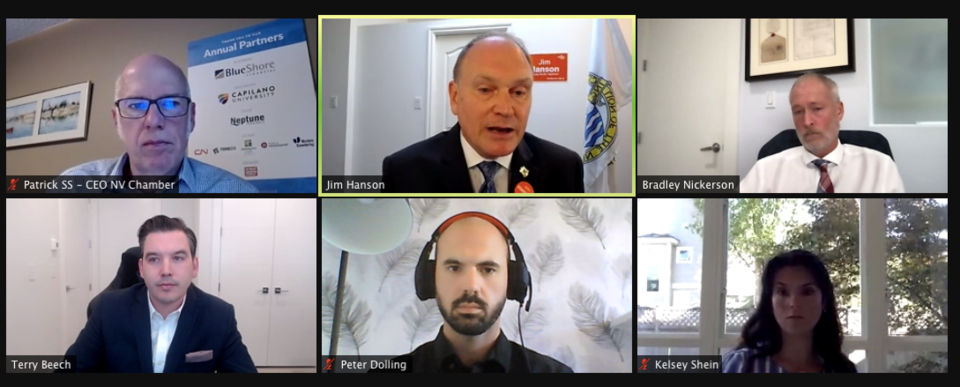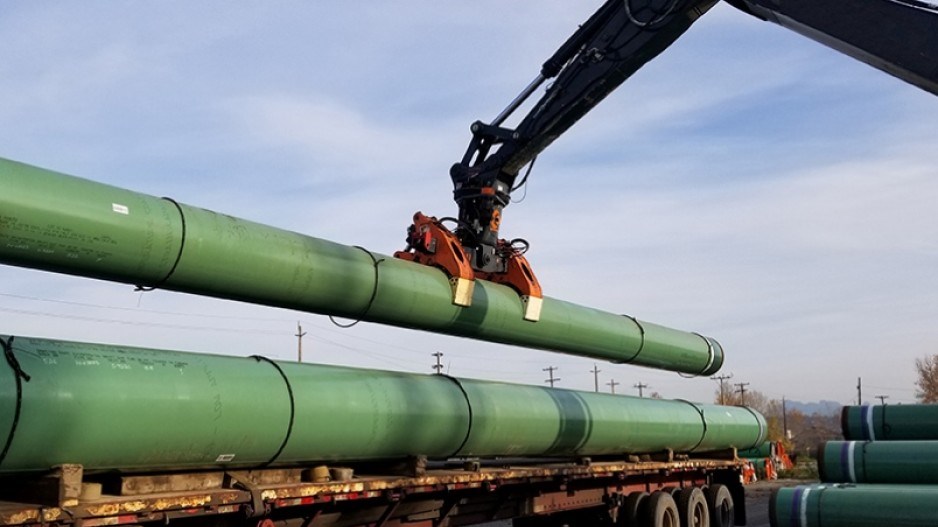The thorny and divisive issue of the Trans Mountain pipeline expansion raised its head this week during a virtual meeting of candidates for Burnaby North - Seymour, the riding in which the terminus for the controversial pipeline project sits.
NDP candidate Jim Hanson said during an online all-candidates forum Wednesday his party will cancel the pipeline project – although federal NDP leader Jagmeet Singh has not committed to that.
Liberal incumbent Terry Beech immediately stepped in to challenge Hanson’s statement, saying it isn’t true.
The pipeline topic came up as candidates in an online forum hosted by the North Vancouver Chamber responded to a question on climate change from moderator Patrick Stafford-Smith, CEO of the chamber.
“The Trudeau record on climate change is appalling,” said Hanson. “Emissions rise and rise and in the face of a pledge to address climate change, he buys a pipeline that costs billions of dollars, which spews bitumen right into our riding of Burnaby North Seymour.”
“Burnaby North - Seymour is ground zero for Trudeau hypocrisy and failure to follow through with his record, and promises on anything, but most especially on climate change,” said Hanson.
Hanson says he hears about the issue of climate change on the doorstep. “We will take this issue extremely seriously, and we will cancel the TMX pipeline, stop it in its tracks,” he said.
Beech, meanwhile, defended the Liberal record, saying his government has “done more to cut pollution in a practical and affordable way than any other government in Canadian history.”
“And by the way, [NDP leader] Jagmeet Singh is not committed to cancelling the TMX pipeline,” he added.
Beech warned Conservatives “have fought our environmental initiatives every step of the way. And now they want to remove the Northwest oil tanker ban and build a pipeline through the Great Bear Rainforest.”
Beech also pointed to Andrew Weaver, the former leader of the BC Green Party, endorsing the Liberal climate plan as “the only credible plan put forward by any party at the federal level.”
Conservative Kelsey Shein didn’t address the pipeline directly in her comments but attacked the Liberals for calling an election while “B.C. is on fire” calling it “a serious mistake and a bit of a betrayal.”
Green Party candidate Peter Dolling said his party would also “immediately cut off any sort of funding” for pipeline development.

The issue of the Trans Mountain pipeline has loomed over the riding ever since the Liberal government first approved, then bought the pipeline expansion, which will deliver oil from the Alberta oilsands to tankers in Burrard Inlet.
Those decisions sparked protests, arrests and lawsuits, including several by local Squamish and Tsleil-Waututh nations, which have vigorously opposed the project.
The issue was a key one in the 2019 federal election in the riding, with many predicting it could spell the end for Liberals in the riding.
Beech, however, hung on to his seat with 17,404 votes (35.5 per cent), while NDP came second with 15,844 votes (32.3 per cent).
More recently, Singh, the NDP leader, chose his words carefully on the topic, telling several media outlets that he’s been opposed to the project from the beginning.
Singh has stopped short, however, of saying he’ll cancel the project, instead stating he would have to assess the situation before making any decision.
Kathryn Harrison, a professor of political science at the University of British Columbia, said that for some in the riding the pipeline project is “a very big issue.”
But in contrast to that, “It’s striking to me that [Liberal] Terry Beech was re-elected in that riding,” she said, adding in the last election “a majority of voters in that riding voted for parties that were supportive of the pipeline.”
While the NDP has been clear in the past that they are opposed to the pipeline, Singh “hasn’t said he’ll cancel it,” she said. “He’s been pressed on that. He’s been given opportunity to say that. And he hasn’t said that.”
Harrison said in some ways it’s understandable as only when a party forms government would they be privy to long-term contracts that may have been signed and what the financial consequences would be of cancelling the project.
Also politically, “governments tend to stay the course on big projects that are already underway where a lot of taxpayers’ money has already been spent,” she said – pointing to the provincial NDP’s decision to continue building the Site C dam as an example. Otherwise, “they can be criticized for just throwing away all those taxpayer dollars.”
Harrison said in terms of other parties, the Conservatives are “all in” on the Canadian oil industry and oil exports, promising to revised the environmental assessment laws and even create a new offence in the criminal code for protesters who block “critical infrastructure.” Recently on the campaign trail, Conservative leader Erin O’Toole spoke of resuscitating the cancelled Northern Gateway pipeline project, Harrison noted. The party is “waving a flag for the oil industry,” she said.
The Greens, as a small party, have a natural disadvantage going into the race, she said. But in addition, “the party is deeply divided” and haven’t announced a detailed platform, despite the public interest in climate change issues. “It’s a real contrast to 2019,” she said.



